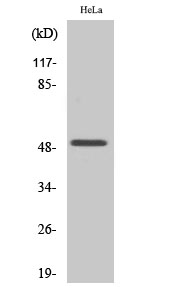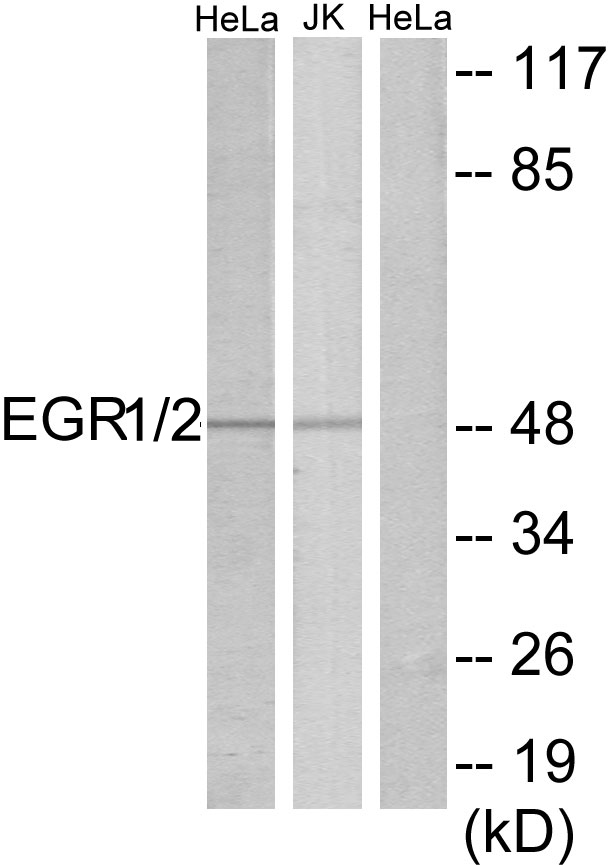

| WB | 1/500-1/1000 | Human,Mouse,Rat |
| IF | 咨询技术 | Human,Mouse,Rat |
| IHC | 1/50-1/100 | Human,Mouse,Rat |
| ICC | 1/50-1/200 | Human,Mouse,Rat |
| FCM | 咨询技术 | Human,Mouse,Rat |
| Elisa | 1/10000 | Human,Mouse,Rat |
| Aliases | EGR2;KROX20; E3 SUMO-protein ligase EGR2;AT591;E3 SUMO-protein transferase ERG2 Curated;Early growth response protein 2 (EGR-2);Zinc finger protein Krox-20. |
| Entrez GeneID | 1959 |
| WB Predicted band size | Calculated MW: 50 kDa; Observed MW: 50 kDa |
| Host/Isotype | Rabbit IgG |
| Antibody Type | Primary antibody |
| Storage | Store at 4°C short term. Aliquot and store at -20°C long term. Avoid freeze/thaw cycles. |
| Species Reactivity | Human,Mouse,Rat |
| Immunogen | The antiserum was produced against synthesized peptide derived from human EGR1/2. AA range:371-420 |
| Formulation | Purified antibody in PBS with 0.05% sodium azide,0.5%BSA and 50% glycerol. |
+ +
以下是关于EGR2抗体的3篇代表性文献,简要整理如下:
---
1. **文献名称**:*EGR2 mutations in inherited neuropathies: implications for Schwann cell development*
**作者**:Warner LE, et al.
**摘要**:该研究揭示了EGR2基因突变与遗传性周围神经病变(如Charcot-Marie-Tooth病)的关联,通过EGR2抗体检测发现突变导致施万细胞分化异常,影响髓鞘形成。
2. **文献名称**:*The role of EGR2 in regulating T cell tolerance and autoimmunity*
**作者**:Zhu B, et al.
**摘要**:利用EGR2抗体进行染色和功能实验,发现EGR2在调节性T细胞(Treg)中高表达,调控免疫耐受相关基因,其缺失可引发自身免疫反应。
3. **文献名称**:*EGR2 expression in cancer: a novel biomarker for leukemia progression*
**作者**:Krones-Herzig A, et al.
**摘要**:通过EGR2抗体检测多种癌症样本,发现EGR2在急性髓系白血病中异常高表达,并与肿瘤细胞增殖和耐药性相关。
---
以上文献涵盖了EGR2抗体在神经系统疾病、免疫调控及肿瘤研究中的应用。如需具体期刊信息或DOI可进一步补充。
The EGR2 antibody is a tool used to detect the Early Growth Response 2 (EGR2) protein, a transcription factor critical in regulating gene expression during peripheral nerve development and myelination. EGR2. part of the EGR family (EGR1-4), binds DNA via zinc-finger domains to activate or repress target genes involved in Schwann cell differentiation, axonal ensheathment, and myelin maintenance. Mutations in the *EGR2* gene are linked to inherited neuropathies like Charcot-Marie-Tooth disease type 1D (CMT1D) and congenital hypomyelinating neuropathy, highlighting its role in neurological disorders.
EGR2 antibodies are widely used in research to study protein expression patterns in nervous tissue, cancer, and immune cells. They enable techniques such as Western blotting, immunohistochemistry, and immunofluorescence, aiding investigations into nerve regeneration, demyelinating diseases, and tumor biology. Specificity is crucial, as EGR2 shares structural homology with other EGR family members. Validated antibodies help distinguish EGR2’s unique functions, such as its interaction with co-regulators like NAB proteins to fine-tune myelination pathways.
By elucidating EGR2’s mechanisms, these antibodies contribute to understanding developmental biology and potential therapies for neuropathies. Their application extends to exploring EGR2’s emerging roles in T-cell tolerance and cancer progression, underscoring their versatility in both basic and clinical research.
×